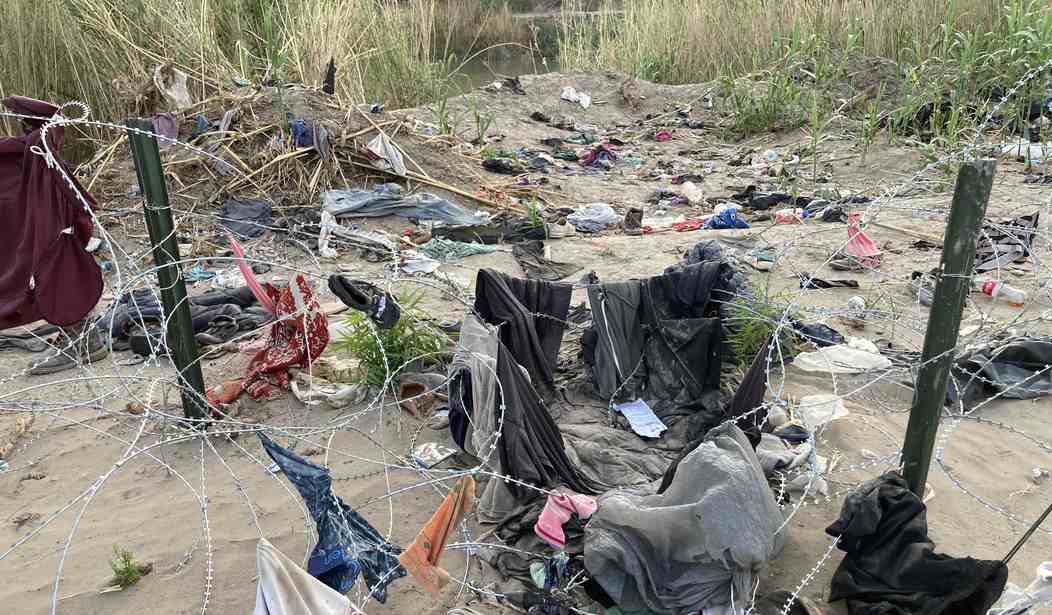Two of the three environmental groups who sued the Trump administration to prevent construction of the wall at the southern border did not respond to inquiries from Townhall to see if they had environmental concerns over the massive piles of garbage created by the tens of thousands illegally crossing U.S.-Mexico border.
Piles of trash along routes at southern border is nothing new, but, the debris has grown significantly in size with many immigrants no longer trying to avoid apprehension. In popular crossing areas from Texas to Arizona, large piles of trash have been documented by Townhall and other journalists who frequent the southern border.
Often times, after illegally crossing either the Colorado River or the Rio Grande, immigrants will discard their wet clothes on the ground and change into dry clothes. Other items include plastic bottles, food wrappers, and medications.
A Border Patrol source in the Yuma Sector, which is one of the hardest-hit sectors, sent me this video of the trash people leave behind after illegally crossing the U.S.-Mexico border: pic.twitter.com/DH2bB5RHRy
— Julio Rosas (@Julio_Rosas11) February 9, 2022
EAGLE PASS: Another migrant debris field!
— Auden B. Cabello (@CabelloAuden) August 1, 2022
Video taken from Piedras Negras as migrants cross illegally and leave behind all their trash.
The wire setup by Abbott is ineffective; they just walk over it. Wasted taxpayer money. pic.twitter.com/GOWoazcq4Y
NEW: Massive amounts of discarded trash and clothing are left behind by migrants at this crossing location in Normandy, TX. We have witnessed enormous groups crossing illegally here over the last 10 days. There are trashed locations like this all over Eagle Pass area. @FoxNews pic.twitter.com/hLGukecEWh
— Bill Melugin (@BillFOXLA) November 10, 2022
Recommended
The Center for Biological Diversity, Defenders of Wildlife, and Animal Legal Defense Fund all sued the federal government to prevent the use of military funds for border wall construction in 2019. The groups reached an agreement with the federal government in 2022 to stop the military funds.
"The previous administration’s disregard for wildlife in critical protected refuges, forests and conservation areas to illegally construct a wall along the border could lead to devastating long-term impacts that will require study and monitoring for years to come," said Animal Legal Defense Fund Executive Director Stephen Wells, according to Border Report. "While the government’s national emergency powers should have never been used for this purpose, we hope this step helps prevent further damage to these communities and ensure such actions don’t occur again in the future."
"The wall and its infrastructure, including lights and roads, have carved a monstrous scar across one of the most biodiverse regions on the continent. Now federal agencies will have to take stock of the damage and begin the important work of trying to heal this environmental and humanitarian disaster," Brian Segee, a lawyer at the Center for Biological Diversity, said.
"The previous administration’s disregard for wildlife in critical protected refuges, forests and conservation areas to illegally construct a wall along the border could lead to devastating long-term impacts that will require study and monitoring for years to come," said Animal Legal Defense Fund Executive Director Stephen Wells.
The Center for Biological Diversity and Defenders of Wildlife did not respond to repeated requests for comment, which included examples of the garbage fields. Only the Animal Legal Defense Fund provided a statement, but said they are focusing on the "larger" impacts of industrial agriculture.
"The Animal Legal Defense Fund is very concerned about the impacts of human activities on wildlife and is focusing on limiting and reducing the much larger impacts of industrial agriculture on the environment, enforcing environmental protection laws, and protecting animal habitats, biodiversity, and migratory routes through the legal system when the government does not do so," said ALDF's Litigation Program Director Anthony Eliseuson.
The piles are not solely located along the banks of the Rio Grande and Colorado River. Ranches near the southern border not only have had to contend with the large groups of illegal immigrants passing through, but also the garbage they leave behind.
John Ladd, whose family's ranch in Arizona goes right up to the southern border, told Townhall they have up to 100 illegal immigrants a day crossing his land. While Ladd's ranch is protected by a border wall, Border Patrol agents have largely been reassigned due to the influx of illegal immigrants giving themselves up in other parts of the state. This results in the trespassers on Ladd's ranch being able to get away as there are no agents to intercept them once they get over the wall.
Since they are trying to avoid detection, the "gotaways" wear camouflage clothing, booties, and a daypack that they shed once they reach the roads and meet their driver.
"The clothes are getting overwhelming, the amount of them...It kills everything underneath the clothes and the daypack," Ladd explained, adding even the local volunteers who have picked up the items in the past have stopped because of the never ending piles.
"We try to pick up as much as we can but only have time to gather what we can see on the roadways throughout the ranch, there are tons left behind that we will have to deal with that we cannot get to," South Texas rancher Ben Binnion told Breitbart in August.
"Leftists are always so concerned about the environment, but not when it's illegal aliens dumping tons of trash all over our border areas. A picture here and there of litter along a section of border doesn't begin to show the real magnitude of the littering issue. It's staggering," the National Border Patrol Council tweeted on Monday.
























Join the conversation as a VIP Member